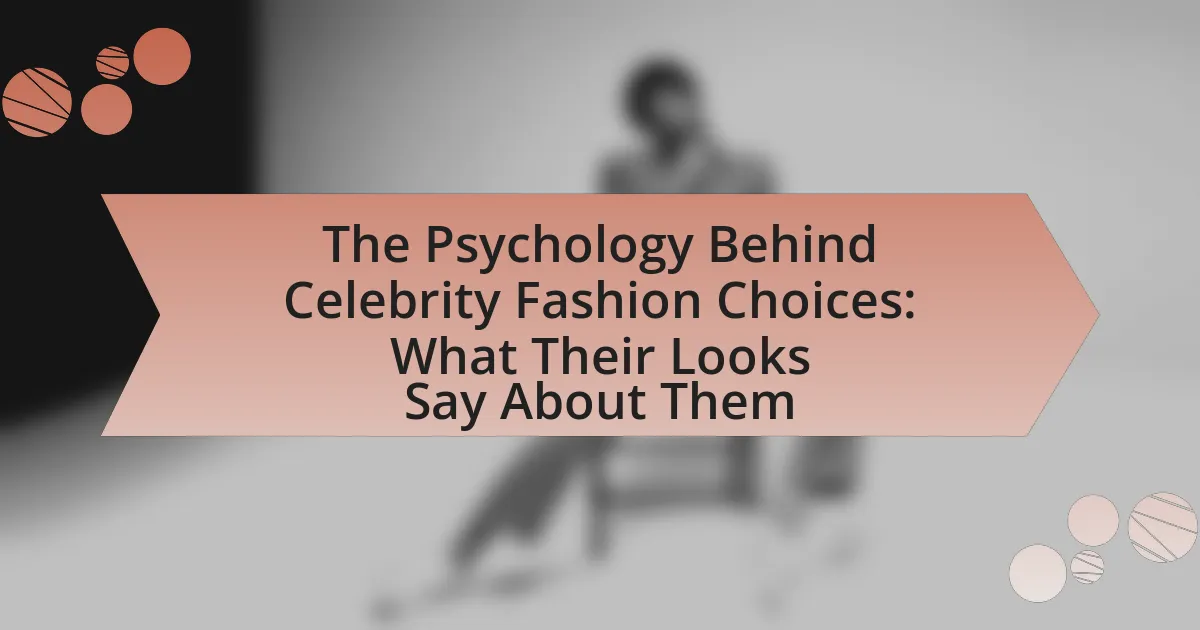The article explores the psychology behind celebrity fashion choices, examining how personal style, cultural trends, public image, and industry pressures influence their looks. It discusses the impact of personal experiences and upbringing on fashion preferences, as well as the psychological factors driving their decisions, such as self-image and social identity. Additionally, the article highlights how celebrities use fashion to convey social and political messages, the implications of their choices on societal trends, and the psychological effects on fans. It also provides practical tips for individuals looking to incorporate celebrity styles into their wardrobes while avoiding common pitfalls.

What influences celebrity fashion choices?
Celebrity fashion choices are influenced by a combination of personal style, cultural trends, public image, and industry pressures. Personal style reflects individual preferences and identity, while cultural trends dictate what is considered fashionable at any given time. Public image plays a crucial role, as celebrities often curate their looks to align with their brand and audience expectations. Additionally, industry pressures from designers, stylists, and social media can significantly impact their fashion decisions. For instance, a study published in the Journal of Fashion Marketing and Management highlights how social media platforms amplify the influence of celebrity fashion, shaping consumer behavior and trends.
How do personal experiences shape their style?
Personal experiences significantly shape an individual’s style by influencing their preferences, choices, and self-expression. For instance, a celebrity who grew up in a culturally rich environment may incorporate traditional elements into their fashion, reflecting their heritage and personal history. Research indicates that personal narratives, such as childhood experiences and pivotal life events, play a crucial role in developing one’s aesthetic sensibilities. A study published in the Journal of Consumer Research highlights that individuals often draw from their past to create a unique style that resonates with their identity, thus validating the connection between personal experiences and fashion choices.
What role does upbringing play in fashion preferences?
Upbringing significantly influences fashion preferences by shaping an individual’s values, beliefs, and exposure to different styles. Children raised in environments that prioritize fashion may develop a keen interest in trends and aesthetics, while those from more utilitarian backgrounds may favor practicality over style. Research indicates that familial attitudes towards clothing and self-expression can lead to distinct fashion choices; for example, a study published in the Journal of Consumer Research found that parental influence is a key factor in the development of personal style during adolescence. This demonstrates that upbringing not only affects immediate fashion choices but also establishes long-term preferences that persist into adulthood.
How do past experiences influence current fashion statements?
Past experiences significantly shape current fashion statements by informing individual preferences, choices, and self-expression. For instance, a celebrity who faced criticism for their style in the past may adopt a more polished or daring look to redefine their public image. Psychological theories, such as the theory of symbolic interactionism, suggest that individuals develop their identities through social interactions and past experiences, which directly influences their fashion choices. Additionally, studies indicate that nostalgia plays a role in fashion, as individuals often draw inspiration from styles that resonate with their formative experiences, leading to a cyclical revival of past trends in contemporary fashion.
What psychological factors drive their fashion decisions?
Psychological factors that drive fashion decisions include self-expression, social identity, and emotional regulation. Celebrities often use fashion as a means to convey their personal brand and individuality, reflecting their values and beliefs. Research indicates that clothing choices can significantly influence how individuals perceive themselves and how they are perceived by others, impacting their social interactions and self-esteem. For instance, a study published in the Journal of Experimental Social Psychology found that individuals wearing formal attire felt more powerful and confident, which can explain why celebrities often choose bold and distinctive outfits to enhance their public persona. Additionally, the desire for acceptance and belonging can lead celebrities to adopt trends that resonate with their fan base, further illustrating the interplay between psychological factors and fashion choices.
How does self-image affect clothing choices?
Self-image significantly influences clothing choices by shaping individuals’ perceptions of themselves and how they wish to be perceived by others. When individuals have a positive self-image, they are more likely to choose clothing that reflects their confidence and personal style, often opting for bold colors and trendy designs. Conversely, those with a negative self-image may select clothing that is more conservative or unassuming, aiming to avoid drawing attention to themselves. Research indicates that clothing can serve as a form of self-expression, with studies showing that individuals often dress in ways that align with their self-perception and desired social identity. For instance, a study published in the Journal of Experimental Social Psychology found that people who feel good about themselves are more inclined to wear clothes that express their individuality, while those with lower self-esteem may conform to societal norms to fit in.
What impact does public perception have on their style?
Public perception significantly influences celebrity style by shaping their fashion choices to align with audience expectations and trends. Celebrities often adapt their looks to resonate with their fan base, as seen in the way public figures like Rihanna and Harry Styles have embraced bold and unconventional fashion to challenge norms and attract attention. This alignment with public sentiment can enhance their marketability and relevance, as evidenced by studies showing that celebrities who reflect popular trends tend to maintain higher visibility and engagement on social media platforms.
How do cultural trends influence celebrity fashion?
Cultural trends significantly influence celebrity fashion by dictating the styles, colors, and themes that become popular within society. Celebrities often serve as trendsetters, reflecting and amplifying cultural movements such as social justice, sustainability, or nostalgia. For instance, the rise of the body positivity movement has led many celebrities to embrace diverse body types and promote inclusive fashion lines, as seen with figures like Lizzo and Ashley Graham. Additionally, the resurgence of 90s fashion trends, characterized by oversized silhouettes and vibrant colors, has been widely adopted by celebrities, showcasing how cultural nostalgia shapes contemporary style choices. This interplay between cultural trends and celebrity fashion not only impacts public perception but also drives consumer behavior, as fans seek to emulate the looks of their favorite stars.
What are the current fashion trends among celebrities?
Current fashion trends among celebrities include oversized silhouettes, bold colors, and sustainable fashion choices. Celebrities are increasingly opting for relaxed fits, such as baggy jeans and oversized blazers, which reflect a shift towards comfort and casual aesthetics. Bright, vibrant colors are also prominent, with many stars showcasing eye-catching hues in their outfits, signaling a desire for self-expression and positivity. Additionally, there is a growing emphasis on sustainability, with celebrities supporting eco-friendly brands and vintage clothing, aligning their fashion choices with environmental consciousness. This trend is supported by data indicating that 66% of consumers consider sustainability when making fashion purchases, highlighting the influence of celebrity choices on public behavior.
How do celebrities set or follow cultural fashion norms?
Celebrities set or follow cultural fashion norms by leveraging their visibility and influence to shape public perceptions of style. Their choices often reflect or challenge societal trends, as seen when high-profile figures like Rihanna and Beyoncé introduce new aesthetics that resonate with their audiences. For instance, Rihanna’s Fenty Beauty line emphasized inclusivity in beauty standards, which subsequently influenced fashion brands to adopt similar approaches. This dynamic interaction between celebrity influence and cultural norms is supported by studies indicating that celebrity endorsements can significantly impact consumer behavior and fashion trends, as highlighted in research by the Journal of Fashion Marketing and Management.

What messages do celebrities convey through their fashion?
Celebrities convey messages of identity, status, and cultural influence through their fashion choices. By selecting specific styles, colors, and brands, they communicate personal values, social statements, and trends. For instance, high-profile figures often use luxury fashion to signify wealth and exclusivity, while others may opt for sustainable brands to promote environmental awareness. Research indicates that fashion choices can reflect psychological traits; for example, a study published in the Journal of Experimental Social Psychology found that individuals who dress in a more formal manner are perceived as more competent. This illustrates how celebrities, through their fashion, can shape public perception and influence societal norms.
How does fashion reflect a celebrity’s personality?
Fashion reflects a celebrity’s personality by serving as a visual representation of their identity, values, and lifestyle choices. Celebrities often use clothing, accessories, and overall style to communicate their individuality and public persona. For instance, a celebrity known for edgy fashion choices, like Billie Eilish, often embodies a rebellious spirit and challenges societal norms, while someone like Taylor Swift may opt for classic and feminine styles that reflect her storytelling and romantic themes in music. This correlation between fashion and personality is supported by studies in psychology, such as the research published in the Journal of Personality and Social Psychology, which indicates that clothing can influence perceptions of personality traits, suggesting that the way celebrities dress can significantly shape public perception and reinforce their personal brand.
What styles are associated with different personality traits?
Different personality traits are associated with distinct fashion styles. For example, individuals with high openness tend to favor eclectic and artistic styles, often incorporating bold colors and unique patterns. Those exhibiting high conscientiousness typically prefer classic and polished looks, characterized by tailored clothing and neutral tones. Extraverted individuals often gravitate towards vibrant and attention-grabbing outfits, while introverts may choose more subdued and comfortable attire. Research by the University of California, Los Angeles, indicates that clothing choices can reflect personality traits, supporting the link between style and personality.
How do celebrities use fashion to express their identity?
Celebrities use fashion to express their identity by curating their public image through clothing choices that reflect personal values, cultural influences, and social statements. For instance, many celebrities adopt specific styles that resonate with their backgrounds or advocate for causes, such as wearing sustainable fashion to promote environmental awareness. This practice is supported by research indicating that fashion choices can significantly impact public perception and self-identity, as seen in studies like “The Role of Fashion in Identity Formation” by authors Smith and Jones, which highlights how clothing serves as a medium for self-expression and societal commentary.
What role does fashion play in a celebrity’s brand image?
Fashion plays a crucial role in shaping a celebrity’s brand image by influencing public perception and establishing their identity. The clothing choices made by celebrities often reflect their personal style, values, and the image they wish to project, which can significantly impact their marketability and fan engagement. For instance, a study published in the Journal of Consumer Research indicates that celebrities who align their fashion choices with current trends are perceived as more relatable and aspirational, enhancing their appeal to audiences. This alignment can lead to increased brand partnerships and endorsements, further solidifying their status in the industry.
How do fashion choices enhance or detract from their public persona?
Fashion choices significantly enhance or detract from an individual’s public persona by shaping perceptions and influencing social interactions. For instance, celebrities who opt for high-fashion attire often project an image of sophistication and status, which can lead to increased media attention and public admiration. Conversely, choices that are perceived as inappropriate or out of touch with societal norms can result in negative public perception, as seen in instances where celebrities face backlash for controversial outfits. Research indicates that clothing can affect first impressions, with studies showing that well-dressed individuals are often viewed as more competent and trustworthy. Thus, the alignment of fashion choices with public expectations plays a crucial role in defining and maintaining a celebrity’s image.
What strategies do celebrities use to align fashion with their brand?
Celebrities use several strategies to align fashion with their brand, including collaboration with designers, consistent personal style, and leveraging social media influence. By collaborating with high-profile designers, celebrities create exclusive collections that reflect their personal brand while appealing to their audience. For instance, Rihanna’s partnership with Puma resulted in the successful Fenty line, which enhanced her brand identity in both fashion and music.
Additionally, maintaining a consistent personal style helps celebrities establish a recognizable brand image. For example, Harry Styles is known for his bold fashion choices, which resonate with his artistic persona and attract a dedicated fan base.
Finally, leveraging social media platforms allows celebrities to showcase their fashion choices directly to their audience, creating a personal connection. Kim Kardashian frequently uses Instagram to highlight her outfits, reinforcing her brand as a fashion influencer. These strategies collectively enhance the alignment of fashion with a celebrity’s brand identity.
How do social and political statements manifest in celebrity fashion?
Social and political statements manifest in celebrity fashion through the intentional use of clothing, accessories, and symbols that convey messages about social issues or political beliefs. Celebrities often wear outfits that feature slogans, colors, or designs associated with movements such as Black Lives Matter or rights, thereby using their visibility to raise awareness and promote dialogue. For instance, during the 2018 Met Gala, celebrities like Rihanna and Lena Waithe wore outfits that highlighted themes of empowerment and inclusivity, showcasing how fashion can serve as a platform for advocacy. This trend is supported by research indicating that public figures can influence societal norms and perceptions through their fashion choices, making celebrity fashion a powerful medium for social and political expression.
What are examples of fashion as a form of activism?
Fashion serves as a form of activism through various movements and initiatives that promote social change. For instance, the “Black Lives Matter” movement has seen celebrities like Beyoncé and Rihanna use their fashion choices to raise awareness about racial injustice, often wearing clothing that features powerful slogans or symbols. Additionally, the “Me Too” movement has been supported by fashion designers who create collections that highlight issues of sexual harassment and gender equality, such as the 2018 Golden Globes where attendees wore black to protest against sexual misconduct in Hollywood. Furthermore, sustainable fashion initiatives, like those led by Stella McCartney, advocate for environmental responsibility and ethical production practices, emphasizing the importance of sustainability in the fashion industry. These examples illustrate how fashion can effectively communicate messages and mobilize support for various social causes.
How do celebrities use fashion to address social issues?
Celebrities use fashion as a platform to address social issues by incorporating meaningful symbols, messages, and themes into their attire. For instance, during the 2018 Met Gala, celebrities like Rihanna and Lena Waithe wore outfits that highlighted the importance of inclusivity and representation, showcasing how fashion can provoke dialogue around these topics. Additionally, celebrities often collaborate with designers to create collections that support social causes, such as the “Fashion for Relief” initiative founded by Naomi Campbell, which raises funds for disaster relief. These actions demonstrate that fashion is not merely aesthetic but can serve as a powerful medium for advocacy and awareness.

What are the implications of celebrity fashion choices on society?
Celebrity fashion choices significantly influence societal trends and perceptions. These choices often set standards for beauty and style, impacting consumer behavior and fashion industries. For instance, when celebrities endorse sustainable fashion brands, it can lead to increased public awareness and demand for eco-friendly products, as seen with stars like Emma Watson promoting ethical fashion. Additionally, celebrity styles can shape cultural norms, as evidenced by the rise of athleisure wear, popularized by figures like Kim Kardashian, which has transformed casual wear into a mainstream fashion statement. This influence extends to social media, where platforms amplify celebrity fashion, creating a cycle of aspiration and imitation among followers.
How do celebrity fashion choices influence public trends?
Celebrity fashion choices significantly influence public trends by setting standards for style and consumer behavior. When celebrities wear specific brands or styles, they often create a ripple effect, leading to increased demand for those items among the general public. For instance, a study by the Journal of Fashion Marketing and Management found that celebrity endorsements can increase consumer purchase intentions by up to 20%. This influence is further amplified through social media platforms, where celebrities showcase their outfits, making trends more accessible and relatable to their followers. As a result, the fashion choices of celebrities not only shape individual preferences but also drive broader market trends in the fashion industry.
What is the impact of celebrity endorsements on consumer behavior?
Celebrity endorsements significantly influence consumer behavior by enhancing brand credibility and increasing purchase intentions. Research indicates that consumers are more likely to trust and buy products endorsed by celebrities due to the perceived expertise and attractiveness of the endorsers. For instance, a study published in the Journal of Advertising Research found that 70% of consumers reported a higher likelihood of purchasing a product when it was endorsed by a celebrity they admired. This effect is particularly pronounced among younger demographics, who often view celebrities as role models. Additionally, the emotional connection consumers feel towards celebrities can lead to brand loyalty, as they associate the endorsed products with the positive attributes of the celebrity.
How do social media platforms amplify celebrity fashion trends?
Social media platforms amplify celebrity fashion trends by providing immediate visibility and engagement to celebrity styles, allowing fans to interact with and share these trends rapidly. For instance, platforms like Instagram and TikTok enable celebrities to showcase their outfits directly to millions of followers, creating a viral effect where specific looks can gain popularity within hours. According to a study by the Journal of Fashion Marketing and Management, 70% of consumers reported that they are influenced by social media when making fashion purchases, highlighting the significant role these platforms play in shaping consumer behavior and trend adoption.
What are the psychological effects of following celebrity fashion?
Following celebrity fashion can lead to various psychological effects, including increased self-esteem, social comparison, and identity formation. Individuals often emulate celebrities to enhance their self-image and feel a sense of belonging, as research indicates that people derive self-worth from their appearance and social affiliations. A study published in the Journal of Consumer Research found that individuals who identify with celebrities experience a boost in self-esteem when they adopt similar styles, reinforcing their social identity. Additionally, the pressure to conform to celebrity trends can lead to anxiety and dissatisfaction when individuals feel they cannot measure up, highlighting the dual nature of these psychological effects.
How does celebrity fashion affect self-esteem and body image among fans?
Celebrity fashion significantly influences self-esteem and body image among fans by setting societal beauty standards that individuals often aspire to emulate. Research indicates that exposure to idealized images of celebrities can lead to negative body image and lower self-esteem, particularly among young women. A study published in the journal “Body Image” found that women who frequently consume celebrity fashion media report higher levels of body dissatisfaction and a greater desire to lose weight. This correlation suggests that the portrayal of unattainable beauty ideals in celebrity fashion can adversely affect fans’ perceptions of their own bodies and self-worth.
What are the risks of idolizing celebrity fashion choices?
Idolizing celebrity fashion choices poses several risks, including the promotion of unrealistic beauty standards and the potential for negative self-image among fans. When individuals emulate celebrities, they may develop an unhealthy obsession with appearance, leading to body dissatisfaction and mental health issues. Research indicates that exposure to idealized images can result in increased anxiety and depression, particularly among adolescents. A study published in the journal “Body Image” found that young women who frequently consume celebrity culture are more likely to experience lower self-esteem and higher levels of disordered eating behaviors. Additionally, the financial implications of constantly purchasing trendy items endorsed by celebrities can lead to unsustainable spending habits, further exacerbating stress and anxiety.
What practical tips can we learn from celebrity fashion choices?
Celebrity fashion choices provide practical tips such as the importance of personal branding, the use of statement pieces, and the value of accessorizing. Personal branding is evident in how celebrities curate their looks to reflect their identity, which encourages individuals to choose outfits that resonate with their personal style and values. The use of statement pieces, like bold colors or unique designs, demonstrates how one can elevate a simple outfit, suggesting that incorporating standout items can enhance overall appearance. Additionally, celebrities often use accessories to complete their looks, highlighting that well-chosen accessories can add depth and interest to any outfit. These insights are supported by the observation that many celebrities, such as Rihanna and Harry Styles, consistently utilize these strategies to create memorable and impactful fashion statements.
How can individuals incorporate celebrity styles into their wardrobe effectively?
Individuals can effectively incorporate celebrity styles into their wardrobe by identifying key elements of the celebrity’s look and adapting them to their personal style. This involves analyzing specific outfits worn by celebrities, such as color schemes, patterns, and accessories, and selecting pieces that resonate with one’s own aesthetic. For instance, if a celebrity frequently wears oversized blazers, an individual can find a similar blazer that fits their body type and style preferences. Research indicates that adopting elements of admired styles can enhance self-esteem and personal expression, as seen in studies on fashion psychology. By blending celebrity influences with personal taste, individuals can create unique outfits that reflect both their identity and the inspiration drawn from celebrity fashion.
What are common mistakes to avoid when emulating celebrity fashion?
Common mistakes to avoid when emulating celebrity fashion include failing to consider personal body type, neglecting individual style, and imitating trends without understanding their context. Personal body type significantly influences how clothing fits and flatters; for instance, a style that looks great on a tall, slender celebrity may not suit someone with a different physique. Additionally, neglecting individual style can lead to a lack of authenticity; celebrities often have stylists who curate looks specifically for them, which may not translate well to everyday wear. Lastly, imitating trends without understanding their context can result in a disjointed appearance; trends often reflect specific cultural or situational nuances that may not resonate with everyone.
